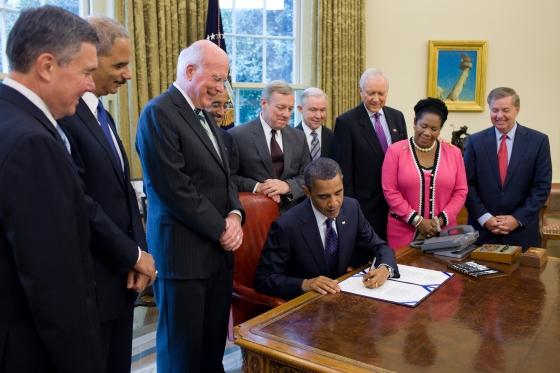Researcher urges U.S. officials to rethink drug policy
President Barack Obama signing the Fair Sentencing Act in 2010. (Photo by the White House
When the United States picked up enforcement of its drug policy in the late 1980’s, criminal crackdowns often led to higher incarceration rates for young African American men.
Some three decades later, one researcher is arguing drugs aren’t the problem at all, but rather the policy itself that needs to be changed.
Carl Hart, associate professor of psychology and a research fellow at the Institute for Research in African American studies at Columbia University, says there is no scientific basis for the argument that there’s a drug problem in the African American community. Poverty is a much greater issue, he said.
“One of the things (scientists)have known, is that drugs do not uniquely affect black people,” he said. “We are not predisposed or addicted at higher rates than anyone else, we don’t sell drugs at rates higher than anyone else, but yet the consequences of these policies impact us disproportionally.”
Drugs are an easy issue to focus on, Hart says, but they take attention away from the other, arguably more important, issues such as high unemployment rates and poverty.
“We know that this incarceration rate really took off in the late 1980’s, the early 1990’s, and it’s a direct result of the war on drugs,” Hart said. “More than half of those folks are there because of drug charges.”
Hart has studied drugs for 22 years in an effort to help solve the addiction problem in the United States. Through his research, Hart says, he found drug addiction isn’t the problem, it’s the drug policy that lawmakers need to be going after.
“Drugs should be looked at in a similar way that we look at driving cars,” he said. “(Cars) can be potentially dangerous and we have laws and restriction to make sure that we can enhance our safety, but we certainly are not giving people criminal records for driving too fast, for getting in an accident, like we are with drugs.”
But that doesn’t mean drugs should be legalized, he added.
“It’s not legal to drive your car too fast, that doesn’t mean legalization, but it certainly means that you should think about decriminalization. That means, when there are infractions, you don’t give people a criminal record, but there are consequences to those infractions,” he said.
Before 2010, crack cocaine was treated 100 times more harshly than cocaine in powder form, Hart said.
But in 2010, President Barack Obama signed the Fair Sentencing Act to decrease the disparity in federal sentencing guidelines between crack cocaine and powder cocaine. But, Hart says scientific evidence suggests the disparity should be eliminated entirely.
“It would be like treating people who smoke marijuana 18 times more harshly than those who use marijuana in their brownies. It’s exactly the same,” he said.
Hart says the so-called war on drugs in disproportionately affecting the African American and other minority communities.
“Without that sort of atmosphere, we don’t get Trayvon Martin, we don’t get Ramarley Graham. You don’t get these types of killings,” he said. “I would’ve liked the administration, as well as the country, to rethink and come out strongly against this sort of view that drugs are so evil we have to go after them at any cost to certain groups.”
